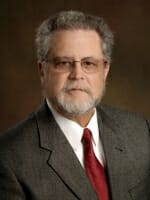
Stephen Waldhalm, PhD, DVM
Associate Dean for Faculty Affairs, Professor, Physiology
College of Veterinary Medicine
•Ph.D. (Veterinary Physiology), Washington State University, 1974
•D.V.M., Washington State University, 1977
•B.S., University of Idaho, 1969
•Professor, Coordinator of Problem-based Learning, College of Veterinary Medicine, Western University of Health Sciences, 2002- present
•Professor, Center for Educational Innovation, College of Veterinary Medicine, Mississippi State University, 1999-2002
•Coordinator of Problem-based Learning, College of Veterinary Medicine, Mississippi State University, 1992-2001
•Faculty, Mississippi State University, Center for Sciences Basic to Medicine, 1977-1992
•Intern, Carnation Research Farms, 1977
"Give a man a fish and you feed him for a day. Teach a man to fish and you feed him for a lifetime."
This quotation is said to be a Chinese proverb, and probably is rooted in debates on foreign aid or welfare. But I find it powerfully illustrates the difference between a welfare-like education philosophy that 'teaching is telling', and my education philosophy that 'learning is a lifestyle' an active process of inquiry driven by a hunger to know. A teacher specializes in creating that hunger, and empowers a student to learn, life-long, independent of the teacher.
I have witnessed greatness in the classroom, by observing teachers and students at work. Greatness can come from either, but glory is to be witnessed when it comes from both. My observations began as a student, but now include the perspectives of peer, counselor and critic. The characterizations of great teaching as enthusiastic, organized, relevant and clearly communicated are hallmark parameters of the classical approach. Unfortunately, these widely used parameters tell only half the story. I believe the best teaching results from shifting the burden of responsibility so that the student is equally (if not more actively) engaged in creating an appetite for learning. I view teaching and learning as two sides of the same coin; inherent in doing the one thing well, you must also do the other. I view teaching and learning as partners in a dance. Great learning must result from inquiry, responsiveness and respect; a relationship that solicits information through dialog. Great teaching must include listening, responsiveness, and respect; a relationship that feeds the student's hunger while fulfilling the teacher's purpose. In this relationship, a teacher learns from his students, often as much as the student learns from the teacher.
To create a teaching-learning dialog, the teacher yields a measure of control to the student. Responsibility sharing enables a more cooperative process that brings the class to a platform of shared goals and interdependent roles. The teacher, more like a coach, acknowledges that the race is run and won by the student. The student, more like a colleague, commits to the effort of learning in a spirit of cooperation. A human relationship emerges that anticipates success.
I am blessed to work among the most gifted young adult students in the world, students of veterinary medicine. Has this good fortune created for me a set of rose-colored lenses? I am pleased to report that I have encountered success and observations identical to those described above, in kindergarten and elementary school classrooms. The picture becomes less clear in the middle school and high school, however it returns clearly again where I have worked with college freshman.
"In everyone's life, at some time, our inner fire goes out. It is then burst into flame by an encounter with another human being. We should all be thankful for those people who rekindle the inner spirit."
Albert Schweitzer
My flame has been regularly restored by my students and the teachers I have observed. My goal then, is to engage people in the teaching-learning paradigm that creates growth in both teacher and student. I seek to share my experiences with others, and give particular attention to enhancing the veterinary profession through innovations in veterinary education.
•Early embryo survival, embryo transfer for endangered species preservation

